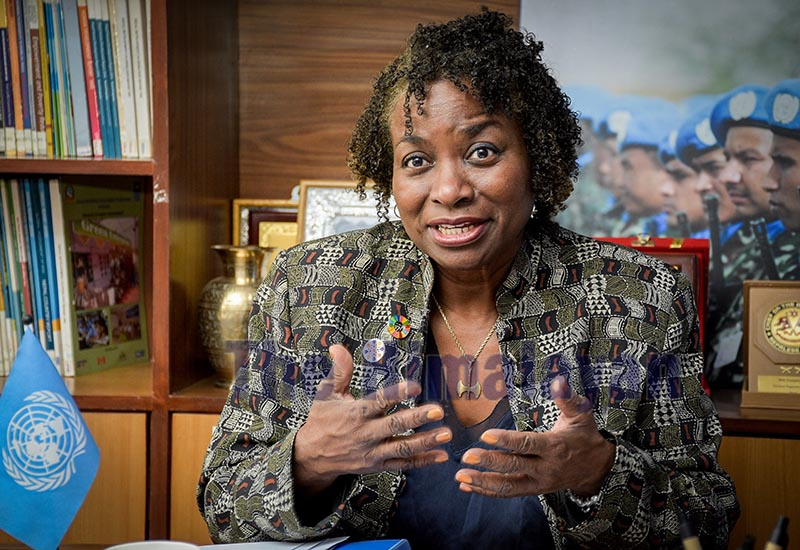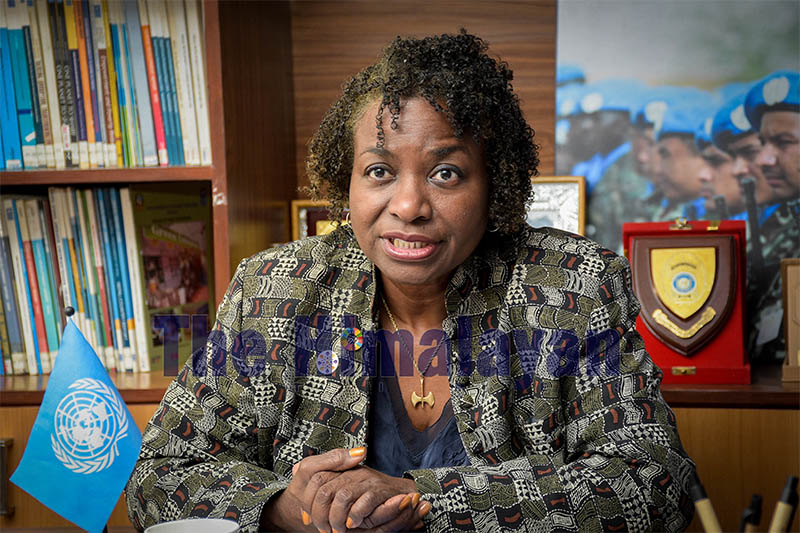It's time to reaffirm the Cairo promise for the rights and choices of all: UNFPA chief

KATHMANDU: The United Nations Population Fund has long had a significant presence in Nepal, supporting government and civil society to reach zero preventable maternal deaths, zero unmet need for family planning and zero gender-based violence and harmful practices including child marriage.
This year marks the 25th anniversary of the signing of the landmark Programme of Action of the International Conference on Population and Development. The ICPD Programme of Action was unanimously adopted in Cairo in 1994 by 179 member states including Nepal. Despite significant gains this past quarter-century, for far too many women and girls around the world including in Nepal, the promise of Cairo has yet to be fulfilled. From 12-14 November, UNFPA in collaboration with the governments of Kenya and Denmark are co-convening the Nairobi Summit on ICPD25.
Dr Natalia Kanem, the Executive Director of UNFPA, visited Kathmandu on her first official visit to Nepal earlier this week. Dr Kanem, who is also UN Under-Secretary-General, also met with the Prime Minister, Deputy Prime Minister and ministers among other stakeholders recognizing the significant achievements by Nepal in relation to the Cairo vision and the commitment of the government to its full implementation by 2030.
Rajan Pokhrel of The Himalayan Times caught up with Dr Kanem for an exclusive interview to talk about the upcoming Nairobi summit, relevance of ICPD and other issues of population and development. Excerpts:
Let’s start with the US Global Gag Rule and the rising opposition to sexual and reproductive health and rights from some right-wing populist movements in Europe, the US, and also in a few developing countries. Amid these threats to universal access to sexual and reproductive health and reproductive rights, how are global SRHR advocates and your agency fighting back?
There are formidable challenges, but there are also undeniable opportunities that we can and must seize. The so-called Global Gag Rule, as well as the defunding of UNFPA by the current US government, definitely impact the health and wellbeing of women and girls in so many parts of the world – as they prevent essential information and services from benefiting those who need them the most, some of the most vulnerable and marginalised women, girls and young persons, primarily in developing nations where the needs are the highest.
Our development partners on the ground are reporting on how essential services have been cut, and how devastating this has been for these populations. We hope the US will look at the evidence and reconsider these restrictions. But this is not just about the US – as you say, there is an escalating pushback on reproductive rights and choices around the world. What countries do now in terms of the International Conference on Population and Development (ICPD) Programme of Action will determine the health and wellbeing of women and girls for generations to come. Without achieving ICPD, we simply won’t achieve the Sustainable Development Goals.
We are gratified at the same time that a coalition of allies and champions of sexual and reproductive health and rights are determined to forge ahead. Movements like SheDecides, which has a strong presence in Nepal, are finding innovative ways to reach young persons and get them involved, to commit to funding and resources for SRHR, to ensure that women and girls and young persons have rights and choices that they can freely and fully exercise.
Indeed, at next month’s ICPD25 Summit in Nairobi, we are calling upon governments and civil society stakeholders to reignite the ICPD movement started in Cairo in 1994 – to renew commitments and take them forward, to show the world why this work is so essential, more than ever.
Globally, there are some contentious views on issues like abortion, comprehensive sexuality education, LGBTI rights. This has been the case in some quarters in Asia as well as in Nepal. That your agency works on these issues, how, in your view, can this be tackled? Do you think these issues will be depoliticized one day?
Yes, these are contentious issues – they have long been and likely will remain so for a while to come. I can’t predict if they will be depoliticized one day, but I would remind all countries that the ICPD, as well as the landmark frameworks that came before and after it, from the UN Charter and the Declaration of Human Rights to the 2030 Sustainable Development Agenda, incorporate rights and choices, dignity and respect and gender equality. These principles also apply to the most intimate, integral parts of our lives, those aspects that shape and define us, that are central to our health and wellbeing across the life-cycle.
We focus on ensuring that all people have full access to sexual and reproductive health and rights. All people means all people, regardless of their sexual orientation, where they were born, how much money they make, or any other characteristic. And, we base our work on clear evidence, data, that shows, for example, that comprehensive sexuality education does not encourage young persons to be sexually active, but instead imbues responsibility and the ability to make the right choices at the right time.
We reiterate, once again, that if every woman had the right to choose when or if to get married, when or if to have children and how many – if every young person had access to optimal sexuality education so their foundation for life and love was strong – we would see a very different scenario in country after country than we do today.
Even 25 years after the Programme of Action was adopted by 179 governments, with Nepal being one, at the International Conference on Population and Development, many women and girls are still denied their rights and autonomy. What is the best way forward?
The quest for genuine gender equality is ongoing, and will remain so for a long while to come; studies and forecasts have indicated that many countries will take years and years, under current circumstances, to achieve this. But that doesn’t mean we have to despair; on the contrary, we need to work harder, and push harder, and create an environment where more and more women and girls are truly empowered to achieve their full potential.For this, it’s essential to involve men and boys. Men and boys are critical to achieving gender equality. In fact, UNFPA and partners are involved in innovative programmes globally, including in Nepal, that do just that – and we are seeing increasing success as awareness strengthens along with a newfound sense of responsibility.
Using robust data as evidence to highlight gaps as well as progress is key to convincing governments and other stakeholders to invest in women and girls – socio-economic arguments are all the stronger when you have reliable data to back them up; which is why we so strongly support countries in conducting accurate censuses and demographic health surveys, for example, because they help map out progress being made, as well as gaps that must be addressed, by governments.
I believe Nepal has tremendous potential but will certainly need to accelerate implementation of its development agenda to achieve the growth and prosperity it aspires to. This includes ensuring the empowerment of women and girls – which is at the heart of the ICPD Programme of Action and Beijing Platform for Action.
The outcome of the 2017 elections is remarkable, with women now holding one-third representation in federal and provincial assemblies and 41 per cent of all local government positions. This is a historic moment for women’s political inclusion. But there is still a need to ensure that these female elected officials can exercise their leadership and functions in what has traditionally been a largely male-dominated space.
There is also a need to look at the underlying factors that are holding women and girls back and find ways to evolve the practices and social norms that continue to present challenges, such as the practice of chhaupadi (where women are banished to a hut or a room outside the home during their cycle) and menstrual restrictions, dowry, son preference, child marriage and of course the prevalence of physical and sexual violence against women and girls.
In all of these vital areas, UNFPA stands ready to support the government in fulfilling its aspirations.






